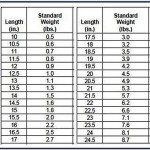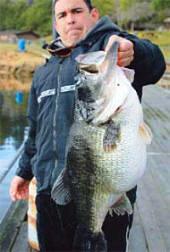Jay came across this article on the PAA wesbite. It kind of reminded me of the same stuff you hear when you go to the doctor. You know, stuff like, “You’re not overweight…for a person who is 6’11”. Then the doc goes into the whole spiel about BMI’s, eating right, yada, yada. Well, just like people of a certain height are “supposed” to weigh a certain weight, fish of a certain length are also supposed to weigh a certain amount. According to the article, “Interestingly, the primary determinant of weight in fish is its length.”
One of the more common “tools” used by biologists and lake managers alike, standard weight tables can be a handy guide for the angler, too. A healthy, fast growing bass of a certain length should weigh a certain amount, called its standard weight. When you compare the weight of a given fish to what it would be expected to weigh, that ratio or calculation is it’s relative weight. A number of 1.0 means the fish is exactly where it should be in a balanced lake. Numbers greater than 1.0 signify very healthy fish weighing more than expected, probably due to either an abundance of food, or fewer bass meaning more food to go around. Numbers less than 1.0 signify a fish that for some reason is below average weight, possibly due to food limitations. Most populations of fish have some normal variations, and typically any bass that falls in the range of around 0.8 – 1.0 is considered “normal”. Anything below 0.8 usually signals a larger problem with the population, or a “sick” fish.
 Anglers can use these charts as a simple guide to estimate what a bass weighs based on how it looks. For instance, if you catch an 18″ bass, standard weight tables say that bass should weigh around 3.2 pounds, assuming good growth and condition. If it’s a skinny post-spawner, you’ll know it weighs a bit less. If it’s a really chunky prespawner, you can safely guess it will weigh a little more. This really comes in handy for bank anglers or others who might not normally carry around a set of scales with them. As long as you have a tape measure with you, you’ll be able to get a pretty good idea of what any fish you catch weighs. You can even print out this chart and carry it with you on your trips as a quick reference tool.
Anglers can use these charts as a simple guide to estimate what a bass weighs based on how it looks. For instance, if you catch an 18″ bass, standard weight tables say that bass should weigh around 3.2 pounds, assuming good growth and condition. If it’s a skinny post-spawner, you’ll know it weighs a bit less. If it’s a really chunky prespawner, you can safely guess it will weigh a little more. This really comes in handy for bank anglers or others who might not normally carry around a set of scales with them. As long as you have a tape measure with you, you’ll be able to get a pretty good idea of what any fish you catch weighs. You can even print out this chart and carry it with you on your trips as a quick reference tool.


























Chad Keogh
March 19, 2012 at 7:56 am
Or, you can buy a digital scale accurate to within 2 ounces for about $30…
Alex Voog
March 19, 2012 at 10:07 pm
I think that Mac’s bass broke the chart, and Chad’s $30 scale… Although “unofficial” I consider Mac Weakley’s bass the world record.
Chad Keogh
March 19, 2012 at 10:10 pm
My scale goes to 50 lbs… 😉
Flip 'N' Pitch
March 19, 2012 at 10:17 pm
One of the funniest things I ever saw as a Marshall for the Elites was when they were catching and trying to cull significantly emaciated post spawners at G-ville. Some guys might take the time to actually weigh each one as they caught it or at least soon after they limited. However, most don’t and just cull by sight alone. So it was somewhat unnatural to watch them as they opened the livewell and put their hands in any one of five ridiculously huge gaping maws. When I say huge I mean wider than Denny Brauer’s massive brick mason bear paws! When they’re that big it is probably unwise to have over 10-15 plus pounds of perturbed lunkers laid out on the floor board to do a side by side comparison. So they would just try to pull their heads up out of the water a bit and guesstimate. Well, that might work normally but in this tournament the biggest head sometimes belonged to the lightest/skinniest fish!
Rich Arnold
March 20, 2012 at 12:52 pm
I have a scale but rarely use it becuase it is pretty much useless. Cullin Beam works every time and gets you the bigger of the two. Only the Tournament scale gets you money. Only an official scale can get you a lake, state, or world record. A $30 digital scale might remove doubt in your mind if your eyeballs aren’t calibrated yet or if there is a dispute in your own boat over who’s fish is bigger.